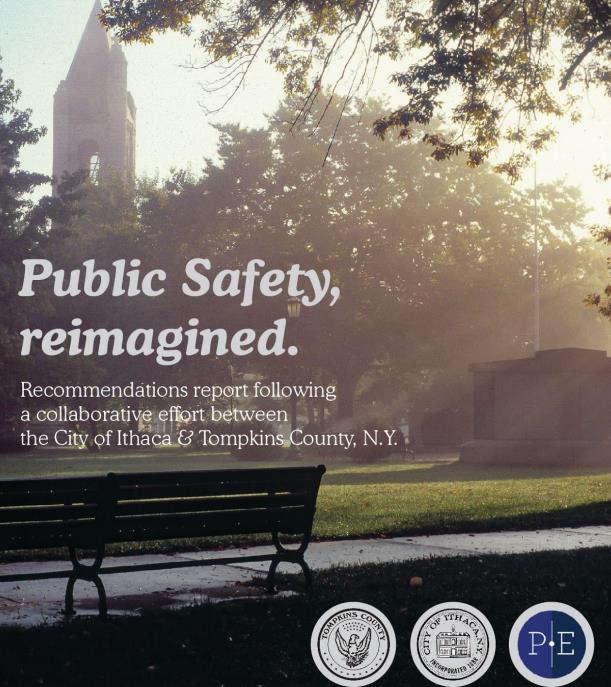County, City cut cord with police-critical Reimagining group
Reporting and Analysis by Robert Lynch, June 26, 2022
The political correctness of it all sounded strangely sweeter a year or two ago than it does today:

“The path forward towards justice requires that we fight for what we believe. This is what we believe….
[First bullet point of three]: “The vicious legacy of White supremacy is a root cause of suffering across the globe. Systems that support White supremacy must be resisted and dismantled.”
Strong words. And words credited to the “Center for Policing Equity” (CPE), a Yale University-based, left-of-center—and some would assert, police-hostile—non-profit organization that with its consulting arm helped the City of Ithaca and Tompkins County craft their joint Reimagining Public Safety Report submitted last year. “Reimagining” is the overly-expensive, endlessly-long, appendix-laden, academically-obfuscated exercise in self-flagellation that’s prompting the City to transform its Police Department into a civilian agency, while also fulfilling an impulsive Andrew Cuomo command of the George Floyd era that municipalities contemplate their navels, root out supposed, systemic badge-on-blue racism… and churn out scores of pages of aspirational circumlocution that Albany promptly puts on a shelf to gather dust. That report.
While no one dares say it directly, times appear a changin’, at least here. On June 21st, the Chair of the Tompkins County Legislature and the City of Ithaca’s Acting Mayor, showed the Center for Policing Equity the door. And Chair Shawna Black took to her Legislature’s floor to make sure everyone got the message.
“Today, Ithaca Mayor Laura Lewis and I informed the Center for Policing Equity that we are no longer going to be working with their organization on Reimagining Public Safety,” Chair Shawna Black told County lawmakers in public session, a meeting sadly few bothered either to attend or to watch.

“We thank CPE for their work and their staff efforts and contributions,” Black continued. “I feel very strongly now that we have our feet under us, having a homegrown process for Reimagining will be the best as we move forward.”
The message was clear: Thank-you, CPE, for the date. Just please, don’t call me again.
Some might think we should see this as just an anecdotal outlier; the severing of a tie that no longer serves any purpose. But look again. An objective, somewhat detached read of Black’s words tells us more. Clearly, for many, the bloom is off Reimagining Public Safety’s police reconstruction rose. Just don’t speak it too loudly.
The 96-page joint City-County Reimagining Report’s key (and most controversial) recommendation, that of converting a traditionally-structured Ithaca Police Department into a two-tiered, civilian-led Department of Community Safety, has driven the sharpest of wedges down Ithaca’s electorate and has openly pitted IPD’s armed officers against City Hall politicians. What’s more, so many of the 2020-21 Reimagining plan’s initial architects have either passed through the exit, or will do so soon.
Ithaca Mayor Svante Myrick, a preening, prime initiator of Reimagining’s police repurposing—and a man now mired in controversy over how he tried to spend public money to advance it—is gone . So is County Administrator Jason Molino, the take-charge, no-nonsense executive who dragged Tompkins County into its partnership with Myrick. And County Chief Equity and Diversity Officer (CEDO) Deanna Carrithers, the mid-level staffer who sources indicate contributed greatly to Reimagining’s bold narrative, quietly tendered her own resignation in early-June. She’ll leave both County Government and the community at month’s end after spending less than two years in her cutting-edge job. County officials never discuss Carrithers’ future professional plans. Neither does she.

So perhaps quite rightly, to jettison CPE from the Reimagining mix is to capture the perfectly-timed moment. Mind you, nearly everyone in power still lauds Reimagining’s local achievements. But many of those same leaders also appear equally eager to run quietly and fast from the troubled process that brought those reforms to fruition. The people now in charge, including Legislature Chair Black, Acting Mayor Lewis, and current County Administrator Lisa Holmes, find themselves, one can envision, picking up the broken pieces of Ithaca’s frangible, police reform flower pot and paving over a rutted road that despite its bumps still reached its intended destination.
“A press release on this topic will be going out this evening,” Chair Black advised her County Legislature upon disclosing her and Lewis’ joint decision to divorce their community governments from CPE. Technically correct. Yet the only “press release” that night from the County was an 1800-word laundry list of the evening’s “legislative highlights,” a jumble that relegated Black’s verbatim comments to a single paragraph buried near its bottom. The release revealed no additional facts or opinions.
A search of the City of Ithaca’s governmental website nearly one week after Black’s disclosure revealed nothing at all in print there. The message couldn’t be clearer. Keep severance with CPE as low-key as possible. Maybe no one else will notice.
****
The Center for Policing Equity might still have remained an ongoing player in the City-County police Reimagining process if not for the dogged intrepidity of one woman, Ithaca City Alderperson Cynthia Brock.
The First Ward Alderperson’s focus on CPE gained prominence by way of the April 4th Op-Ed she wrote for The Ithaca Voice. “My concern,” Brock stated, “is that it is unclear to what extent the restructuring will be influenced by privately-funded advocacy groups’ agendas.”

Brock singled out the Center for Policing Equity as one such advocate. Mayor Myrick invited CPE to the table, she asserted. CPE was “[i]nvolved in every step” of the two-year process, Brock wrote. They provided “hundreds of hours of CPE staff time,” and provided it for free. Yet, she maintained, “There was no selection process abiding by NYS procurement laws, no public review of CPE’s qualifications.” What’s more, she added, “There was no real discussion of CPE’s impact on the work of the City and County, or CPE’s agenda in ‘working for free.’”
Perhaps most provocatively, Brock’s Op-Ed faulted CPE’s CEO, Dr. Phillip Atiba Goff, for jumping to conclusions regarding what her Common Council had yet to decide, Goff allegedly telling media outlets that Ithaca had “voted to dissolve its Police Department,” and that the police union had endorsed the dissolution. Neither statement, Brock said, was correct.
In her Op-Ed, the Alderperson quoted Goff from a purported August 2021 Chicago public radio station interview. Brock wrote:
“Dr. Goff recalled a text and phone exchange with Myrick where Goff suggested that Ithaca didn’t need a police department, to which Myrick responded ‘Yeah, cool. Let’s make that happen.’”
Alderperson Brock’s complaint against CPE comprises just one finger of her many-tentacled allegations. Perhaps her principal concern relates to payments Mayor Myrick allegedly promised two local facilitators in the City’s more recent efforts to actually implement the 2021 Reimagining Report’s recommendations; to transform visionary platitudes into what one might call police reform “deliverables.”
Brock has alleged Myrick made his promises without Common Council authorization and in violation of ethics standards. She’s also requested the ex-mayor be investigated for potential conflicts of interest between his former elected office and a side-job he held with the advocacy group, People for the American Way, a part-time position that blossomed into his becoming PFAW’s Executive Director last February, a promotion that prompted Myrick’s resignation as mayor.

Brock’s allegations aplenty have dragged the matter before the Tompkins County Ethics Advisory Board, a sleepy, seldom-used tribunal that took its first look at the Alderperson’s complaint June 7th. Deliberating mostly in secret, the Ethics Board decided to issue “requests for information” to so-called “interested parties,” most of them remaining, for now, publicly unidentified.
The Ethics Board did, however, name the City and County governments as two such parties. But whether the Board’s reach will extend to such people as Myrick, Goff, Molino, or Carrithers, the public has yet to learn.
According to media reports, in remarks drawing striking parallels to the January 6th Investigation, Ethics Board Chair Rich John, a Tompkins County legislator, said he’d prefer those contacted appear voluntarily, rather than be subpoenaed.
And there’s another strange parallel to the January 6th Committee. In a May 9th tweet, quoted by the Ithaca Voice, former Mayor Myrick described the Brock-initiated investigation against him as “a smear campaign” and asserted that “A fair, independent investigation will clear our names and end this witch hunt.”
Question: Was that the wisest choice of words for an ethically-embattled liberal Democrat to use at this precise moment?
For its part, the Center for Policing Equity has not taken Cynthia Brock’s allegations lying down.
“CPE hopes that there will be a renewed focus on the valuable and evidence-led recommendations outlined in the report itself rather than specious accusations from a disgruntled few seeking to derail the process of justice,” the organization said in a May 4th statement. “We look forward to continuing to collaborate with the Reimagining Public Safety Working Group and all who are committed to building a safer, healthier, and more just Ithaca,” the statement continued.
But now, as they say, that won’t happen. Shawna Black and Laura Lewis made sure of that.
Still, much of the Brock-Myrick foray brushes Tompkins County government only peripherally. In the nearly 15 months since Ithaca Common Council and the Tompkins County Legislature concurrently endorsed and dispatched that Reimagining Report to Albany in March 2021—to, of course, sit on that proverbial shelf—most media, political and community focus has zeroed its attention upon the Ithaca Police restructuring. By contrast, Tomkins County’s policing reform has proven relatively modest; yawningly boring, in fact.
At its June 21st meeting, perhaps in a valiant attempt to deflect attention from the County’s severed ties with CPE, Chair Black noted progress in Sheriff Derek Osborne’s recruitment of two Sheriff’s Clerks for the Department’s newly-launched “unarmed pilot program.” The program employs deputy-like officers— one man and one woman, for now—who, without guns, will respond to benign matters like car-deer accidents.
“I’m excited to hear about the program as their work begins,” Black told legislators.

“I’m glad we’re getting the ball rolling with this program.” Sheriff Osborne said in a media release two days later. “This is a chance to look at what we’re doing differently and continue to work toward being a more inclusive law enforcement agency.” The program, Osborne said, “goes live” in early July.
The unarmed officers, clearly put, create an initiative without controversy; a most convenient of distractions. And the program’s inception serves as County Government’s principal policing reform under Reimagining. As a cautious politician might observe, best keep it that way.
And unless people like the former County Administrator or the departing CEDO become implicated in legislator John’s ethics probe, County hands remain clean. Alderperson Brock’s complaints occur in the City and stay in the City. Time will tell whether they do. Yet because of last Tuesday’s joint City-County announcement, that pesky little Center for Policing Equity stands nowhere close to get in the way.
“The work we do to improve the systems we have should not impede the work we do to create the systems we need,” Dr. Goff wrote on CPE’s page of the City-County Reimagining Report. He continued, “And any workaccomplished inside systems should not be used as a shield against, or as an off-ramp away from, the work communities are doing.”
I guess. Whatever. Dr. Goff, you’ll have to practice that philosophy somewhere else.
###

